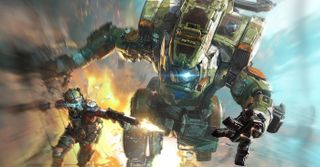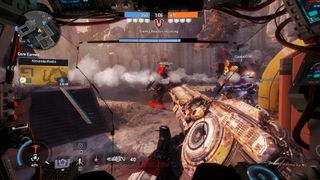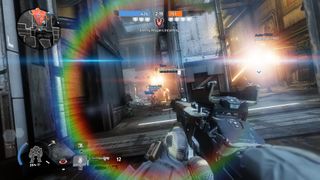Titanfall 2's horde mode brings warmth and teamwork to a brilliant if strangely forgettable FPS
Why isn't Titanfall 2 the biggest shooter in the world?

Titanfall 2 is in the middle of a double XP event to celebrate the expansion of the horde mode Respawn added last month. It seemed like as good a time as any to check in and confirm that, yes, this is still one of the best shooters around, and no, I don't know how I completely forgot it existed mere weeks after it came out. Perhaps you too have experienced Titanfall 2 amnesia, a condition that causes this superb 91-scoring shooter to fall out of the brain the moment you look away from the mechs.
The co-op mode is called Frontier Defense. You team up with three other pilots and protect a glowing blue power core thing from waves of robots. Sometimes the robots are man-sized; sometimes they are miniature titans; sometimes they are 'nuke' titans that explode when you destroy them. Occasionally clouds of drones fly in over the rooftops to cloak the robots.
The mode encourages you to work with your team in a few small ways. You earn cash for kills, which you spend at a shop between rounds. It's common to buy power cores and slot them into wounded titans. There is something oddly pleasing about the sound of a pal clambering all over your carapace to slot a big battery into your mech's brain. Because you can't really mess up on ordinary difficulty levels, it's also a safe place to learn what all the titans do. I've been using the mode to learn Monarch, an enormous mech with a gun that steals shields.

The best thing about the mode is that it's a relatively low-intensity way to enjoy all of Titanfall 2's systems. I have replayed the excellent single player campaign multiple times just to get a hit of Titanfall's sublime wall-running and jetpack jumping. Titanfall combines the best first-person platforming in games with the roaring immediacy of Call of Duty's guns. I tend to prefer the physicality of projectile weapons over lasers and energy blasts. Titanfall does have laser weapons, but most of its weapons trade on the sound of rounds exploding out of barrels at scary speeds. One of the game's most basic weapons, the CAR, is a great example, and wonderful when fired from the hip mid-wallrun. Frontier Defense is a good way to enjoy all that without the pressure of competition.
The singleplayer campaign is a riot of jungles, sunsets and glowy time travel stuff, why are the multiplayer maps often so gloomy?
The mode isn't perfect. Games go on a bit too long and you mostly end up firing machineguns endlessly into choke points. The mode is overseen by some very enthusiastic, forgiving and friendly NPCs who sound like the sort of people who run corporate team-building days. I forgot to flag that I was ready for a new round to begin and one of them blurted to the effect of 'HEY BUDDY NOT TO BOTHER YOU BUT JUST TO LET YOU KNOW YOU CAN READY UP ANY-TIME WOO I LOVE SHOOTIN' ROBOTS!'
I like this attempt to warm Titanfall up a bit. Christian Donlan recently suggested that Titanfall's faceless industrial look might be holding it back, and that is particularly a problem in Titanfall 2's strangely bleached multiplayer environments. The singleplayer campaign is a riot of jungles, sunsets and glowy time travel stuff, why are the multiplayer maps often so gloomy? I think this issue matches up with another: Titanfall 2 is an individualistic team shooter in an era where structured team play is popular. Titanfall comes from the Call of Duty lineage. Overwatch is influenced in part by Team Fortress and Dota. The former encourages short bursts of play to feed your profile's XP bar, the latter is a social game built on trust and inter-reliance.

The audience has chosen this for Titanfall 2. The dominant mode is attrition, in which players rack up kills on NPC drones and the opposing team in a race to hit a magic winning number. You are part of a team, but you're functionally a solo operator fighting for a respectable position on a scoreboard. I suspect you can build the most absorbing progression system ever created around this and it still wouldn't stick, because as good as it is—and it is technically superb—it lacks human drama and it doesn't create stories. Even the most basic Overwatch story—'my team sucks hammers and even though I tried hard we got battered'—is more engaging than target practice, even if that target practice is beautifully designed and consistently more fun.
The biggest gaming news, reviews and hardware deals
Keep up to date with the most important stories and the best deals, as picked by the PC Gamer team.
Titanfall has the features to become more sociable. It has classes, and a good capture the flag mode that nobody seems to want. But if players are looking to Titanfall as an alternative to teamwork-heavy shooters like Overwatch or Rainbow Six: Siege, then this is its fate. There are elements of Titanfall's design that breed lone wolves. I think big experience bars and unlocks encourage players to focus on their own progress above all else. The modular class system is all about curating the game to match your own preferences, whereas an Overwatch equivalent gives you a character with a skillset that defines your battlefield role for you. You can choose your hero in Overwatch, of course, but the power relationship between you and the game is different. 'You're the boss, go shoot things how you want to' says Titanfall. 'Thanks,' I say, 'I will sit on this rooftop and kill pilots with a sniper rifle until I have levelled up.' Without some heavy nudging from the design side, many players will avoid potentially stressful co-operation with strangers.
I actually enjoy this about Titanfall 2. I'm not going to get into any arguments jumping into a few rounds of Attrition. And perhaps I'm wrong, and the fact I haven't stuck to a great game like this is a symptom of an overcrowded market full of brilliant games like Rainbow Six: Siege and Lawbreakers. Not that Titanfall 2 is dying. Numbers are up and you can reliably get a game on a Wednesday morning, which is a good sign. However, I know that the moment I publish this I will forget that Titanfall 2 exists. Then I will remember in six months, and then write about how good it is again on PCGamer.com. See you then.
Part of the UK team, Tom was with PC Gamer at the very beginning of the website's launch—first as a news writer, and then as online editor until his departure in 2020. His specialties are strategy games, action RPGs, hack ‘n slash games, digital card games… basically anything that he can fit on a hard drive. His final boss form is Deckard Cain.
Most Popular

